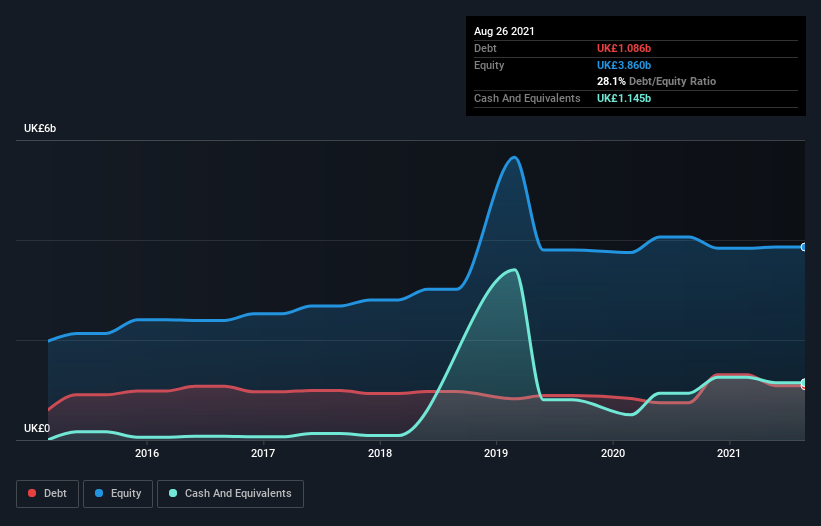
Howard Marks put it nicely when he said that, rather than worrying about share price volatility, 'The possibility of permanent loss is the risk I worry about... and every practical investor I know worries about.' It's only natural to consider a company's balance sheet when you examine how risky it is, since debt is often involved when a business collapses. As with many other companies Whitbread plc (LON:WTB) makes use of debt. But is this debt a concern to shareholders?
What Risk Does Debt Bring?
Debt assists a business until the business has trouble paying it off, either with new capital or with free cash flow. If things get really bad, the lenders can take control of the business. While that is not too common, we often do see indebted companies permanently diluting shareholders because lenders force them to raise capital at a distressed price. Having said that, the most common situation is where a company manages its debt reasonably well - and to its own advantage. The first thing to do when considering how much debt a business uses is to look at its cash and debt together.
Check out our latest analysis for Whitbread
What Is Whitbread's Debt?
As you can see below, at the end of August 2021, Whitbread had UK£1.09b of debt, up from UK£747.3m a year ago. Click the image for more detail. However, its balance sheet shows it holds UK£1.14b in cash, so it actually has UK£59.0m net cash.

How Healthy Is Whitbread's Balance Sheet?
The latest balance sheet data shows that Whitbread had liabilities of UK£723.3m due within a year, and liabilities of UK£4.32b falling due after that. Offsetting these obligations, it had cash of UK£1.14b as well as receivables valued at UK£120.8m due within 12 months. So its liabilities total UK£3.78b more than the combination of its cash and short-term receivables.
While this might seem like a lot, it is not so bad since Whitbread has a market capitalization of UK£6.50b, and so it could probably strengthen its balance sheet by raising capital if it needed to. However, it is still worthwhile taking a close look at its ability to pay off debt. While it does have liabilities worth noting, Whitbread also has more cash than debt, so we're pretty confident it can manage its debt safely. There's no doubt that we learn most about debt from the balance sheet. But it is future earnings, more than anything, that will determine Whitbread's ability to maintain a healthy balance sheet going forward. So if you're focused on the future you can check out this free report showing analyst profit forecasts.
In the last year Whitbread had a loss before interest and tax, and actually shrunk its revenue by 19%, to UK£1.0b. That's not what we would hope to see.
So How Risky Is Whitbread?
By their very nature companies that are losing money are more risky than those with a long history of profitability. And the fact is that over the last twelve months Whitbread lost money at the earnings before interest and tax (EBIT) line. Indeed, in that time it burnt through UK£55m of cash and made a loss of UK£284m. Given it only has net cash of UK£59.0m, the company may need to raise more capital if it doesn't reach break-even soon. Summing up, we're a little skeptical of this one, as it seems fairly risky in the absence of free cashflow. For riskier companies like Whitbread I always like to keep an eye on whether insiders are buying or selling. So click here if you want to find out for yourself.
Of course, if you're the type of investor who prefers buying stocks without the burden of debt, then don't hesitate to discover our exclusive list of net cash growth stocks, today.
Valuation is complex, but we're here to simplify it.
Discover if Whitbread might be undervalued or overvalued with our detailed analysis, featuring fair value estimates, potential risks, dividends, insider trades, and its financial condition.
Access Free AnalysisHave feedback on this article? Concerned about the content? Get in touch with us directly. Alternatively, email editorial-team (at) simplywallst.com.
This article by Simply Wall St is general in nature. We provide commentary based on historical data and analyst forecasts only using an unbiased methodology and our articles are not intended to be financial advice. It does not constitute a recommendation to buy or sell any stock, and does not take account of your objectives, or your financial situation. We aim to bring you long-term focused analysis driven by fundamental data. Note that our analysis may not factor in the latest price-sensitive company announcements or qualitative material. Simply Wall St has no position in any stocks mentioned.
About LSE:WTB
Whitbread
Operates hotels and restaurants in the United Kingdom, Germany, and internationally.
Good value with adequate balance sheet and pays a dividend.


